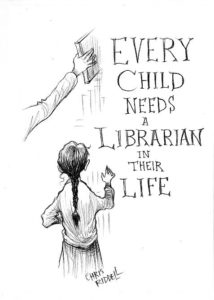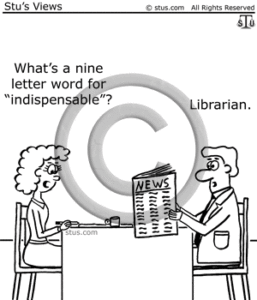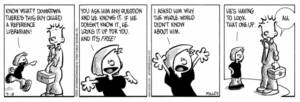Librarians…They’re expendable?
Minna and Lina were having lunch one day in the school cafeteria. Lina was bemoaning the fact that their school district had eliminated the elementary school librarian’s position the previous year. “What are we supposed to do during Library time now, since there is no longer a librarian to guide us?”
Minna wasn’t as concerned. “Why do you need a librarian? The library is for getting books. There’s still a library clerk and a library aide. They can check out books, work the computers to see who has what book out, and pretty well know what books are available if kids need help. Besides the digital catalog (OPAC) knows all the books. Kids can just search like we do to find books they like and see if those books are in. Besides, the cost saved by not having a librarian can be used to buy more materials and even support personnel for the classroom. Seems like a no-brainer cost saving method.”
Lina wasn’t appeased. “And who do you think is going to teach the students how to do those searches on the computer? Who’s going to be knowledgeable about the books, not only in the library but which new ones to purchase?”
“Can’t the teachers do that?” Minna responded. “They can read reviews and make recommendations. I’m sure one lesson in their computer labs with their students should be enough to teach their kids how to use OPAC.”
“And what part of their curriculum do you think they should drop in order to add this to  their day?” Lina was getting more flustered. “The reason that librarians are now called library-media specialists is that they are trained to do so much more. It’s a full-time job to read reviews on all the new books that come out each year. They need to balance what are the best books to purchase that the district can afford. At an early age, they need to teach children not only how to search out information, for reports and such, but also how to discriminate between fact and opinion, real and fake information. They also have to show students how to cite their sources and give credit where credit is due. This is a lot more than just handing out and collecting books. And a lot more than teachers can add to their plate.”
their day?” Lina was getting more flustered. “The reason that librarians are now called library-media specialists is that they are trained to do so much more. It’s a full-time job to read reviews on all the new books that come out each year. They need to balance what are the best books to purchase that the district can afford. At an early age, they need to teach children not only how to search out information, for reports and such, but also how to discriminate between fact and opinion, real and fake information. They also have to show students how to cite their sources and give credit where credit is due. This is a lot more than just handing out and collecting books. And a lot more than teachers can add to their plate.”
Minna still wasn’t convinced. “How to cite sources? What kind of Masters theses are first graders going to do? They can wait until high school to learn those skills. That’s why they are keeping the librarian in the high school.”
Lina responded, “Would you like to know why so many students in middle and high school have so much trouble with plagiarizing notes and copying text right out of a book or off the internet? Because they were not taught at an early age to give credit to those that help them. In my class, if a parent, brother, sister, uncle, friend and so on, does anything to help a student with an assignment or project, the student has to write down that person’s name as a source, even if all they did was to write the title of the report for the student. You’re never too young to acknowledge a source.”
Minna had to stop and think about that. “I guess that is a good way to learn the skill. But do you need a librarian to do that?”

“In that instance, you don’t. Everyone should be teaching that. But a librarian is a major player in a school, especially in an elementary school. Having one allows the classroom and specials teachers to focus on using research to gather information and get their students to work on independent learning projects with the assurance that those students will have the skills (taught by a librarian) to do the research.
It allows both students and teachers to have an important resource for new reading material both in fiction and non-fiction, that have been selected with their needs in mind. As technology improves and becomes more prevalent in society, it allows everyone to keep up with it and use it to its fullest extent.”
All Minna could do was listen and try to internalize what she had just heard….and finish her lunch.


